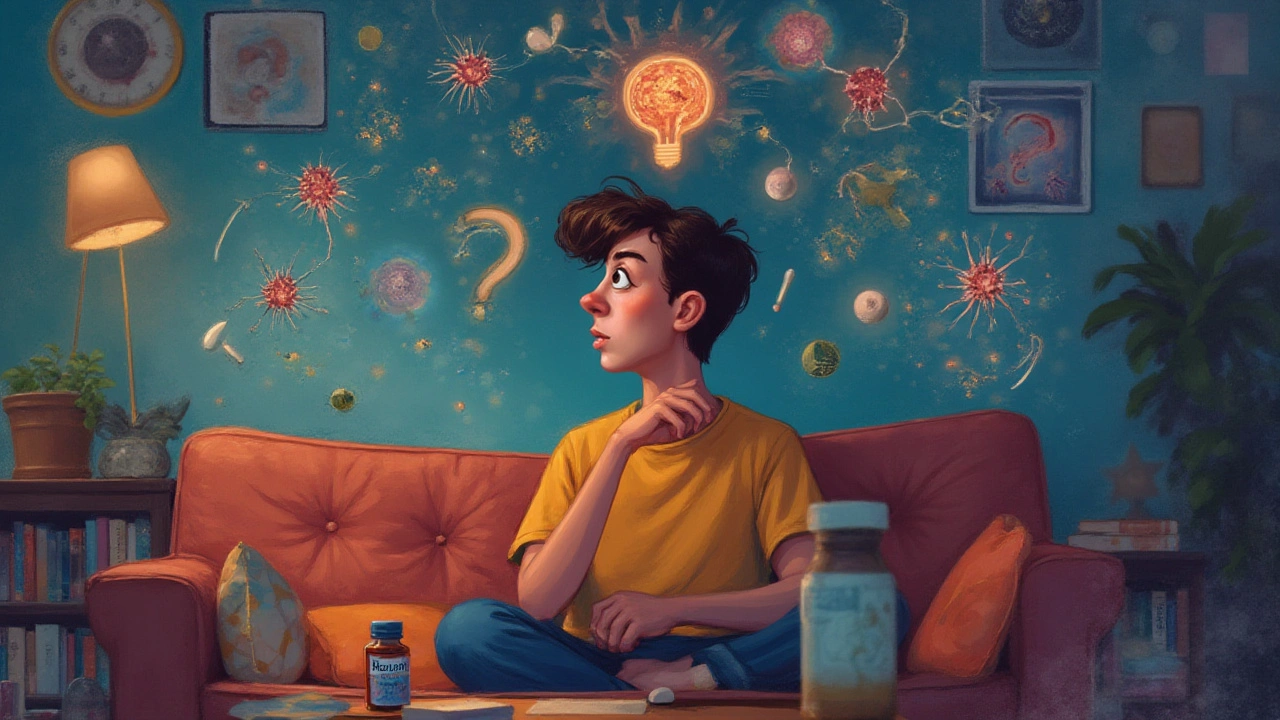Picture this: You’re lying in bed, mind racing, anxiety clutching your chest. You spot that pink box of Benadryl in your medicine cabinet and remember hearing it “might help with nerves.” Next thing you know, you’re popping a couple pills and waiting for relief. It sounds almost too easy. Yet scroll through any anxiety forum and you’ll find dozens of people claiming Benadryl — yes, the same stuff for allergies — can take the edge off anxious spirals. If you raise an eyebrow at that, you’re not alone. Why does Benadryl even help with anxiety? Or, more pointedly, does it really help at all? If I could ask my cat, Jasper, he’d probably just blink lazily and go back to sleep. But humans like us want real answers, not furry shrugs.
The Benadryl Breakdown: What Happens in the Brain
Let’s get into what Benadryl (that’s diphenhydramine, if you want to sound fancy at parties) is actually doing once swallowed. Benadryl’s claim to fame is blocking histamine, the itch- and sneeze-causing chemical allergies love. But the brain’s got its own histamine system, and histamine here isn’t about runny noses — it’s about wakefulness. Benadryl blocks histamine H1 receptors in the brain, and when that happens, you get drowsy. That’s why your eyes feel heavy after an allergy dose. This drowsiness isn’t exactly “treating” anxiety — but when you’re anxious, being forced into a sort of chemical calm can feel like something.
But how exactly does it work? Visualize your brain like a bustling city — histamine is like the city’s energy drink, keeping everything alert and on-task. Benadryl comes in and unplugs the vending machines, so everything slows down. That zoning out, sleepy feeling is sedative, which many people confuse with feeling less anxious. After all, it’s tough to panic when you can barely keep your eyes open. Some real studies back this up: in a 2017 review, Benadryl showed mild sedative effects, but wasn’t a first-choice recommendation for anxiety. The American Psychiatric Association doesn’t list it for anxiety treatment, but it’s sometimes used in hospital settings for short-term calming.
There’s another layer with Benadryl’s effect on a different brain system — one that uses acetylcholine. Benadryl also blocks what’s known as muscarinic receptors (which aceylcholine uses to do things like help you focus and remember), and this is where the trouble starts for some users. That “can’t think straight” groggy vibe? That’s the anticholinergic side of Benadryl, which isn’t some bonus anti-anxiety perk, but more like a side effect. At higher or frequent doses, this can cause confusion, memory problems, and — ironically — more anxiety in the long run. The FDA has even warned about this for older adults, since side effects like dizziness and delirium can be dangerous. So next time you hear about Benadryl being a quick fix for nerves, remember: it’s blocking more than just anxiety.

The Real Power of Placebo: Why Benadryl Feels Like It Works
Now let’s talk about placebo, because that pink pill’s reputation for soothing anxiety has a backstory. The placebo effect gets called “just in your head,” but it’s a real, measurable response. Honestly, our minds are way more powerful (and weird) than we give them credit for. For example, a 2022 analysis out of Stanford showed that people who expect relief from a pill will report less stress, even if the pill is pure sugar. When you believe something will work — especially if it’s an “official medicine” from your bathroom shelf — your body sometimes follows along.
With Benadryl, the sedation kicks in. You notice your thoughts slowing, your body relaxing a bit, and maybe your heart stops thumping so hard. Even if the root of your anxiety isn’t going anywhere, the feeling of “doing something” about it can bring its own wave of relief. One classic psychiatry study found up to a third of people given a dummy pill for anxiety still reported feeling better, just thanks to the ritual of taking something. Add that to Benadryl’s genuine sedative punch, and it’s not surprising folks believe it’s working as an *anxiolytic* — even if science says otherwise.
This gets complicated, though. Because if expecting Benadryl to calm you is what’s calming you, that effect can wear off. The brain isn’t stupid; if anxiety lingers or worsens, your mind might stop cooperating with the placebo. Worse, once you start to depend on Benadryl for sleep or to manage stressful situations, your baseline for “calm” might shift — not because you beat anxiety, but because you’re sedated or groggy about it. Psychologists call this “negative reinforcement,” and it can mess with your self-confidence. If you think you need Benadryl for every anxious moment, you might start avoiding real tools that actually work — like therapy, breathing exercises, or calling a friend. My cat, Jasper, just sits in the window and watches birds when he’s stressed; maybe he’s onto something.
By now, you’re probably wondering if it’s ever smart to use Benadryl for anxiety at all. Honestly, there isn’t “one weird trick.” Most experts say it’s a bad plan for more than emergency, one-off use — like if you’re panicking before a long flight and can’t get a prescription for the real deal. Even then, you should talk to someone who knows your health history first. If sedating your anxiety feels like the only way through, this article on why does Benadryl help with anxiety has a breakdown of safer, more reliable options.

Side Effects, Safer Swaps, and What Actually Works
If Benadryl is mostly a placebo (plus a whopping dose of drowsiness), why do some keep reaching for it? That answer is no secret: it’s cheap, it’s familiar, and unlike prescription anxiety drugs, you don’t have to explain yourself to a doctor. People crave immediate relief, especially if they’re afraid of judgment or stigma around mental health. But the drawbacks rack up fast.
First, side effects. People think over-the-counter means “no risk,” but Benadryl’s risks are anything but imaginary. Aside from drowsiness and brain fog, there’s a whole menu of unwelcome extras: dry mouth, blurry vision, constipation, and — in rare but real cases — rapid heartbeat, urinary retention, and dangerous confusion. Take it for more than a night or two, and things can get gnarly, fast. There’s an especially grim link between chronic anticholinergic use and dementia, seen in several large 2019 studies. Not to mention, if you’re pairing it with alcohol or other sedatives, you could straight up stop breathing while you sleep.
If you’re on other meds, Benadryl can stack up trouble. For example, mixing it with antidepressants (especially some like paroxetine or amitriptyline) can double up on anticholinergic effects. I’ve got an uncle who tried using it instead of his anxiety meds — all he got was a week of confusion and half a dozen worried calls from his wife. For older adults, the risks multiply: a higher chance of falls, delirium, and even hospital trips. The FDA flags Benadryl as “potentially inappropriate” for seniors for good reason.
So what to do instead? For occasional anxiety, there are safer over-the-counter options, though results vary. Some swear by L-theanine (found in green tea), or magnesium supplements, which have mild calming effects in solid studies. Even CBD, while not a magic bullet, is being investigated for anxiety, and so far, side effects are milder than diphenhydramine. If you’re really struggling, cognitive behavioral therapy (CBT) isn’t just a buzzword; it gets at anxiety’s root, not just the symptoms. And if you need medication, newer antihistamines like cetirizine or loratadine don’t cross the blood-brain barrier much at all — meaning no cloud-brain, but also no sedation. That’s probably a good thing.
- Try deep-breathing or grounding exercises if anxiety spikes at night. Even focusing on the sound of your own breath can distract your brain from panic.
- Practice good sleep hygiene: lights out, screens off, cool room, and keep caffeine for the morning. My cat Jasper insists on sleeping next to the window, but we can’t all be that chill.
- If you absolutely feel you need medication for stress, talk to a real doctor instead of self-medicating. You don’t have to go it alone.
The bottom line? Benadryl’s ability to help with anxiety is more about confusion (and sedation) than actual healing. If you want reined-in nerves without the brain haze, skip the pink pills and have a chat with your doctor. They won’t judge you for snagging solutions off the allergy aisle; but you deserve the real thing, not a side-effect masquerade. Next time you’re tempted, imagine Jasper’s lazy yawn — and be as gentle with your own brain as he is with his catnip mouse.


Comments (8)
Paul Baker July 12 2025
benadryl got me through my first panic attack in college lol i thought i was dying but then i took one and just passed out for 4 hours woke up fine 🤷♂️Jeremy Mattocks July 13 2025
I’ve spent the last 8 years researching antihistamines and their CNS effects, and honestly, Benadryl’s reputation as an anxiety tool is a perfect storm of placebo, sedation, and dangerous misunderstanding. The histamine H1 blockade is real-it knocks you out like a soft punch to the forehead. But calling that ‘anxiety relief’ is like calling a blackout ‘stress management.’ What people are feeling isn’t calm-it’s chemical paralysis. And the anticholinergic effects? That’s not a feature, it’s a bug. Chronic use correlates with cognitive decline, especially in people over 45. I’ve seen patients on nightly Benadryl for ‘sleep’ or ‘nerves’ end up with memory gaps, urinary retention, and delirium by their 60s. It’s not a solution-it’s a time bomb wrapped in pink packaging. The real fix? CBT, exercise, sleep hygiene, and if needed, SSRIs or SNRIs prescribed by someone who actually knows what they’re doing. Don’t trade long-term brain health for a quick nap.Sarah McCabe July 14 2025
i live in ireland and we have this weird thing where everyone uses benadryl for everything 😂 i once saw a guy take two before a job interview because he was ‘too wired’… he fell asleep in the waiting room lmao 🤭Zack Harmon July 16 2025
THIS IS WHY AMERICA IS FALLING APART. PEOPLE ARE POPPING ALLERGY PILLS LIKE CANDY BECAUSE THEY’RE TOO LAZY TO GO TO A DOCTOR. YOU WANT TO ‘FIX’ ANXIETY? GET A THERAPIST. GET OUTSIDE. STOP USING YOUR MEDICINE CABINET AS A PSYCHIATRIC CLINIC. THIS ISN’T A TIKTOK HACK, IT’S A MEDICAL EMERGENCY IN THE MAKING.Jeremy S. July 16 2025
i used benadryl once when i was overwhelmed and it did help me sleep. not because it cured my anxiety, but because it let me stop fighting my brain for a few hours. no judgment. just real.Jill Ann Hays July 17 2025
The pharmacological mechanism of diphenhydramine as a first generation antihistamine with significant anticholinergic properties renders it unsuitable for chronic anxiety management despite transient sedative effects which may be misinterpreted as therapeutic benefit. The placebo component is statistically significant in clinical trials yet does not constitute a viable long term intervention strategy. One must consider the neurocognitive risks associated with prolonged muscarinic receptor antagonism particularly in aging populations where the incidence of dementia is already elevatedMike Rothschild July 18 2025
I get it. When your brain is screaming and you’ve got no access to therapy or meds, grabbing something off the shelf feels like the only move. But here’s the thing-you don’t have to stay there. That feeling of quiet after Benadryl? It’s not peace, it’s pause. And pauses are okay if they’re temporary. But don’t let it become your only tool. Start small. Five minutes of breathing. A walk around the block. Text a friend. Talk to your doctor. You don’t need to be fixed overnight. You just need to keep showing up for yourself.Ron Prince July 19 2025
so now we’re telling people to take ltheanine or cbd instead of benadryl? what next? drinking chamomile tea and whispering to your aura? this country is full of weaklings who cant handle stress without some hippy supplement. benadryl is cheap and it works. if you cant handle that then maybe you should move to germany where people actually deal with life